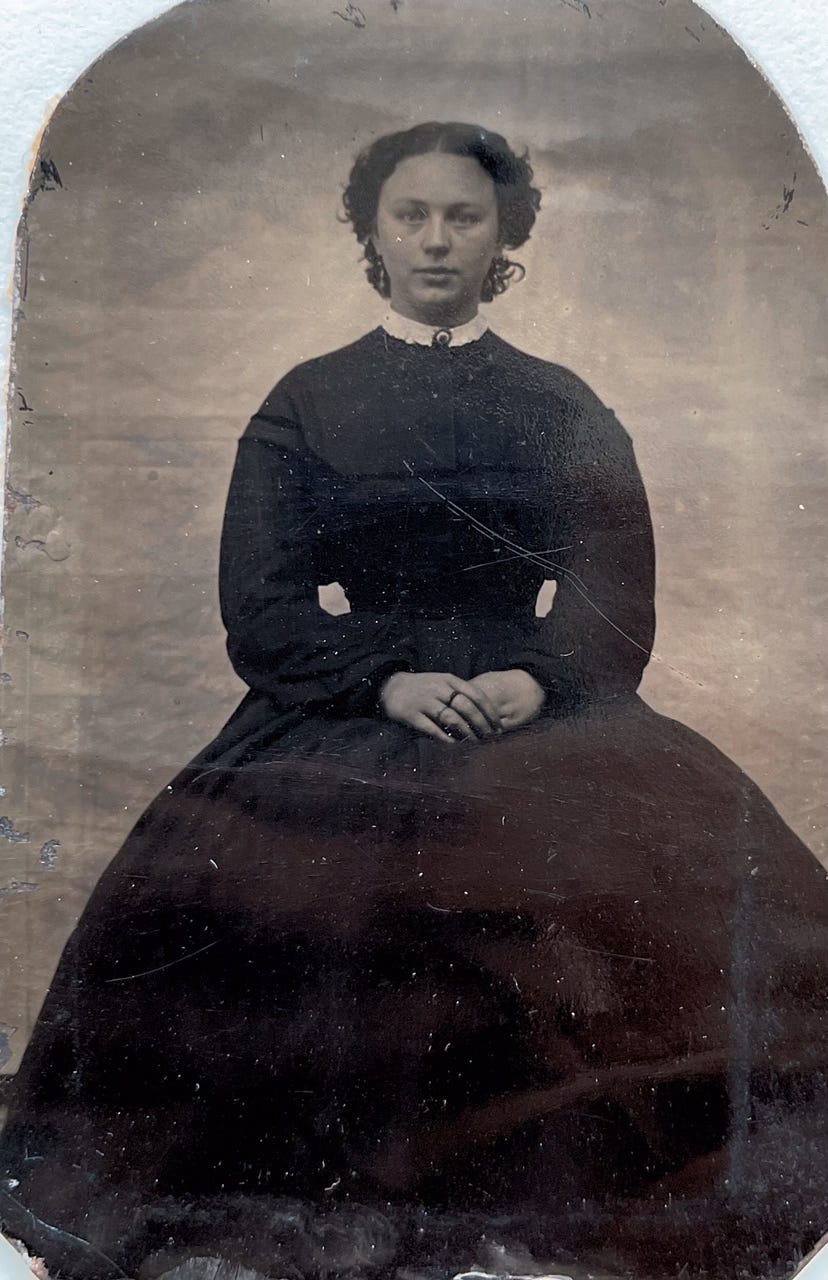Women's History: Two Ordinary Women, Two Extraordinary Lives
Molded by tradition, reshaped by circumstance—the journey of two 19th-century women forging new paths in a new country.

I haven’t commuted for work in years, but now find myself traveling to the 19th century each day to piece together the life of ancestors.
The journey is a slog, so I wear comfy clothes that allows hunching over my computer for hours at a time, and clipping back my hair so no stragglers distract. I’m armed with my water bottle, coffee, and a bottomless bowl of a trail mix of dark chocolate, cashews, and almonds.
Dad was the historian for the Italian/Sicilian side of my family, and traced family to the 16th century. It was fairly easy, he told me, since the Council of Trent mandated the recording of baptisms in 1563.1 The family’s parish in Termini Imerese, Sicily, dutifully complied.
My great-great grandmother was Paola Rosaria Aglieri-Rinella Pusateri. Quite the mouthful. She went by Rosaria.
“She was a force,” said Dad’s Uncle John. “She was known as the ‘Dowager Queen’.”
“Why was she called that?” my 12-year-old-self wondered aloud. I was pretty sure it wasn’t a compliment.
“Because her word was final. She sent my father over here to the States when he was just 16.”
“Came over first class,” interjected John’s cousin Anthony. “Bypassed Ellis Island.”
I didn’t understand the relevance then, but I noticed the sense of pride. I loved listening to Uncle John’s stories. He was my Poppa’s younger brother. But where Poppa was quiet, John and Anthony were quite animated especially when they discussed family lore. John with his white hair, wore thick black glasses and short-sleeved dress shirts. When The Sopranos came out, Junior reminded me of John. Anthony, nearly 20 years younger, had a more patrician look—always polished. I never tired of listening to John and Anthony talk about Rosaria.
“She sent the next two sons over a couple years later, and then a few years after that came over with the youngest ones, including my father,” explained Anthony.
I recalled the facts, but I wanted to know the woman. As I researched Rosaria, I learned she was pregnant with her seventh child when she was widowed. When I canvassed baptismal records, I saw there was not one - but two babies with the same name. When an infant died, which happened to nearly one in four children at that time, the next child was often given the name of the deceased. I couldn’t imagine grieving a husband, wondering if my newborn would survive infancy, and planning to uproot my life.
As I researched the economics of 19th Century Sicily, I found that Sicilian men were enticed to move to the United States with the promise of work on projects like the Erie Canal or in new factories, leaving women and children behind. While Rosaria’s husband apparently wasn’t interested, she had a different vision of her future. Once widowed, Rosaria controlled her own destiny. She packed up her youngest three children and left the family’s olive groves for Lockport, NY, a city on the Erie Canal about an hour from Buffalo.
“She was enterprising,” Uncle John told me. “She knew that Italians that had come here would be hungry for Italian food. She opened up a dry goods store of pastas, sauces, and olive oils.”
Remembering my own trips to Sicily, I realize that Rosaria brought her heritage to Lockport, ensuring that her children—and the community—could feel connected to their roots.
“Named it A. Rinella & Sons,” said Anthony.
I was curious. “Why did she have a different last name than her husband?”
“She did everything her way,” laughed Uncle John.
“Her family had money,” interrupted Anthony.
It was years later that I learned ‘Dowager Queen’ was the name given to a widowed queen – who still thought she was in charge. But as a kid, I saw Rosaria as an entrepreneurial trailblazer to be admired. She was a woman who did things her way, whether the men around her liked it or not.
With a Sicilian last name, dark hair, dark eyes, and growing up around Dad’s family, I felt an affinity for my Sicilian roots that I didn’t have with Mom’s Irish heritage. It didn’t help that Mom passed away in 1986 and her family lived 400 miles away. That part of my life was close to extinction. But reconnecting with my Irish relatives led me to another woman—one whose story mirrored Rosaria’s in striking ways. Despite being from entirely different worlds, their stories carried the same echoes of resilience.
Fortunately, over the last few years, I’ve reconnected with a couple of cousins and Mom’s eldest sister, Molly. My cousin Chris researched Mom’s side - a melange of Irish, Dutch, and British. We have roots that extend to British knights, lord and ladies, including Lady Mary Shelton and her mother Lady Anne Boleyne Shelton. Lady Anne wasn’t that Anne Boleyne, but she was the Queen’s aunt. Her daughter, Mary, was the Queen’s younger cousin and also served in the Queen’s court (and likely had an affair with Henry). More auspiciously, Mary was one of three female editors of the Devonshire Manuscripts, a collection of love poems and literature from Anne’s court.2
But alas, any claims to royal trappings were severed when Mom’s grandfather on her dad’s side was essentially disowned. Smitten with my great grandmother, Catherine Kearney, Franklin converted to Catholicism to marry her.
I might never have known about Catherine’s cousin Leonora if it weren’t for Aunt Molly,3 who is still sharp at 102. She casually mentioned that our ancestor, Leonora Kearney Barry Lake, was a labor activist—a true force in her time.
Like Rosaria, Leonora was widowed – with three young children. A native of Ireland, and no stranger to poverty, she didn’t have family money to fall back on. Leonora’s eldest and only daughter died a few months after her husband, desperate to survive, she took a job in a hosiery mill in Amsterdam, NY. The conditions and wages were appalling.
She climbed the ranks of the local Knights of Labor assembly, a forefront of today’s unions.4 (Despite its name, there was absolutely no connection to royalty.) As a national investigator, Leonora recorded the abominations faced by women, children, and men in mills and factories throughout the country.
An impassioned orator, she lobbied politicians to inspect factories and root out abuses – and in 1889, a factory inspection bill she largely wrote, was passed by the State of Pennsylvania.
Despite her accomplishments, so little has been written about her. Pumped up on dark chocolate, I canvassed dozens of databases looking for any smidgeon of information. I had an epiphany to expand my research to include her new married name, Lake. Paydirt.
In an old newspaper archive, I found a first-hand account written by Leonora Lake that offered new trails to wander down. And fortuitously, St. Lawrence County Historian Betsy Kepes, introduced me to Leonora’s great-great granddaughter, Julie. Julie has sent me family pictures and images of notations from the family bible. These rare artifacts are shedding more light on this incredible woman.
Though Leonora only had a grade school education, her mother—fluent in seven languages—instilled in her a hunger for knowledge. That intellectual foundation, though informal, would later fuel her rise as a labor organizer—where men, including bishops, sought to tear her down for daring to demand dignity for working women. But unlike how they referred to Rosaria, their insults were never so regal as 'Dowager Queen.’

Rosaria and Leonora followed the expected paths laid out for them—marriage, motherhood, duty. But loss—the tragic deaths of husbands, even children—reshaped their lives, forcing them onto new paths. Their strength wasn’t born from tradition, but from necessity.
Or was it? Were their roles as mothers what truly shaped their resilience? Did the very thing that tethered them to tradition also give them the courage to break from it?
As I piece together their stories, I can’t help but wonder: how much of our strength is forged by choice, and how much by the forces that leave us no choice at all?
What I Am Reading
I’m almost half-way through Unsheltered by Barbara Kingsolver. Love the parallel paths about two families who reside in the same broken down home in Vineland, NJ - 150 years a part. For me, this is less about the characters — than about the scenery. The painstaking attention to historic detail is engrossing and a reminder for me to research dinnerware in the 1880s. But another theme emerges — change - or in actuality, the resistance to it. Both families are dealing with cultural shifts. The title is less about the old rickety house that threatens to no longer give them cover, but the fact that we need to stand in the sunlight - unsheltered - and look for our own evidence. A very timely tale, indeed.
https://www.legacytree.com/blog/catholic-christening-baptism-records#:~:text=The%20Catholic%20church%20instituted%20record,of%20the%20Council%20of%20Trent.
https://melanievtaylor.co.uk/2024/02/13/the-devonshire-manuscript-its-place-in-history/
Strolling Through History With Aunt Molly
I attended a wedding in Lake Winnipesaukee-area last weekend. It was a beautiful drive from our home in New Jersey up to Newburgh, NY, then across Connecticut, before cutting north around Worcester, MA. Tim and I make the trip fairly frequently as our son Alex lives in the Boston area. We avoid the god-awful congestion and inevitable stoppages that occu…
Union Is Community; Community Is Power
I don’t usually watch award shows, but I had to tune in when I saw Jane Fonda was being honored with a Lifetime Achievement Award from the Screen Actors Guild (SAG). A longtime activist, I figured the current political climate would be the perfect setup for Fonda. I wasn’t wrong – but it was not the speech I expected.








Not only did both survive the premature death of their husbands, they lived full and meaningful lives. What a legacy to drawn upon and pass down.